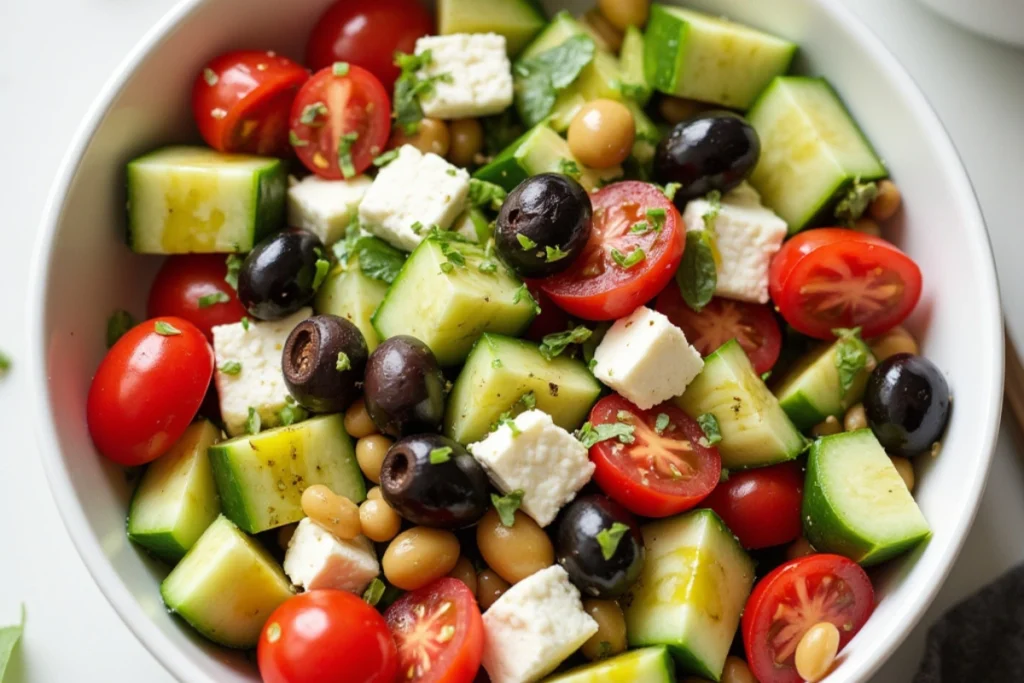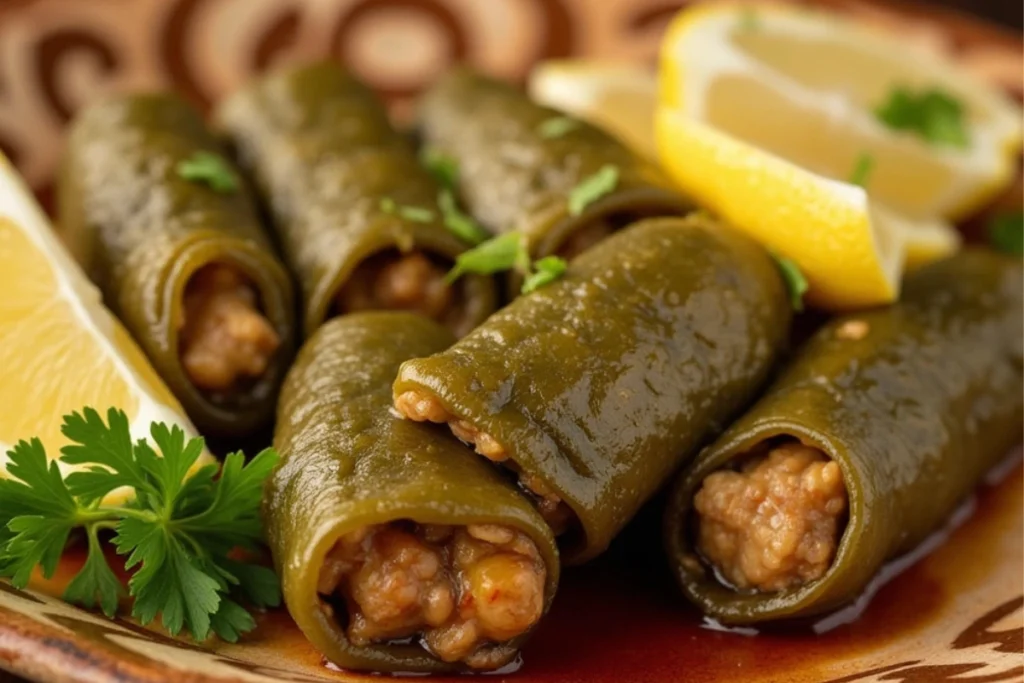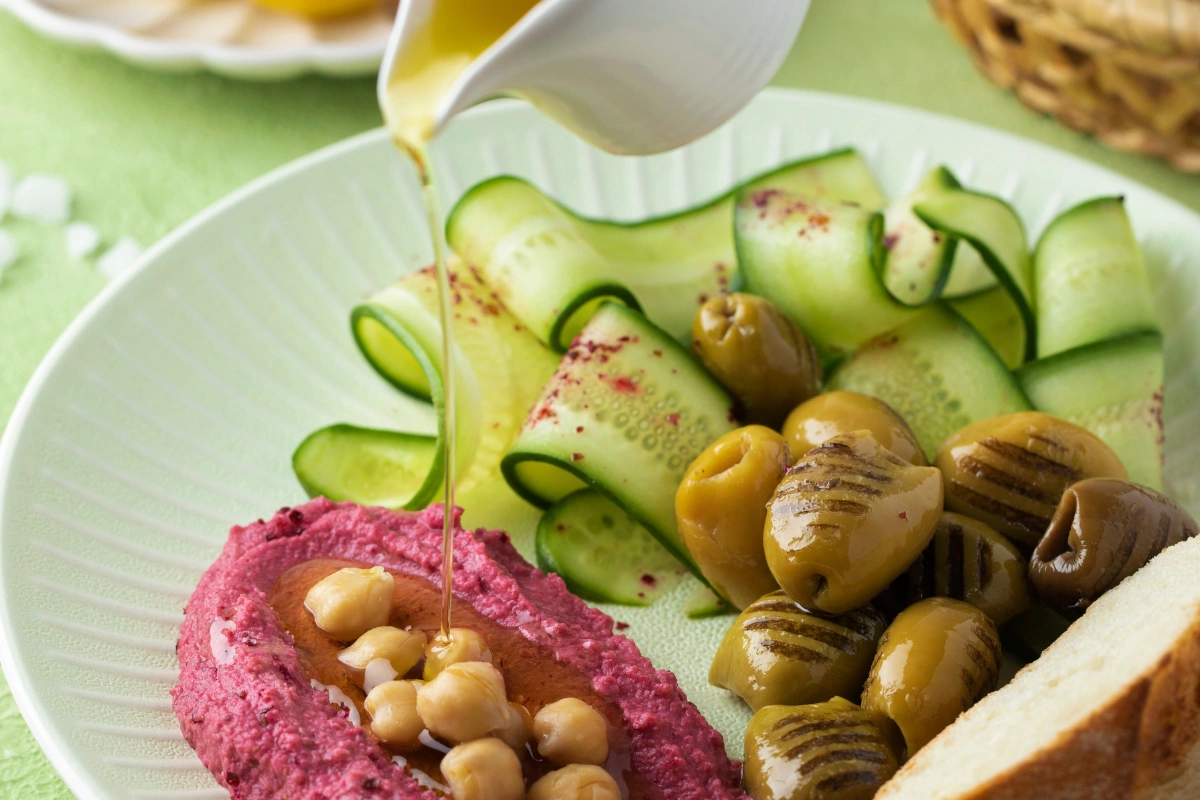Introduction to Vegan Mediterranean Recipes
Mediterranean cuisine is renowned for its fresh ingredients, rich flavors, and incredible health benefits. When combined with a vegan lifestyle, it becomes a powerhouse of nutrition and deliciousness. The principles of this diet align naturally with plant-based eating, as seen in various vegan Mediterranean recipes. These dishes often feature staples such as legumes, olive oil, and fresh vegetables, as highlighted in the vegan Mediterranean diet guide and vegan Mediterranean main dishes. This article takes you on a flavorful journey through some of the best vegan Mediterranean recipes, highlighting essential ingredients, health benefits, and easy-to-follow tips. Let’s dive in!
What is the Mediterranean Diet?
Overview of the Mediterranean Diet
The Mediterranean diet originated in the coastal countries surrounding the Mediterranean Sea. People celebrate it for its vibrant ingredients, balanced nutrition, and focus on whole, fresh foods. Key staples include olive oil, fresh vegetables, legumes, whole grains, and a variety of herbs and spices, as outlined in the Mediterranean diet guide. These essential components are also emphasized in vegan Mediterranean recipes and Mediterranean main dishes that showcase their versatility.
This diet encourages mindful eating by prioritizing quality over quantity. More than just food, it represents a lifestyle deeply rooted in culture and tradition.
Veganizing the Mediterranean Diet
Vegans can adapt this diet easily and creatively. Many traditional Mediterranean recipes already exclude animal products and rely heavily on plant-based staples. By substituting dairy with almond yogurt or cashew cheese and replacing meats with lentils or tofu, you can create delicious vegan versions of classic dishes.
These simple adjustments preserve the authentic flavors of Mediterranean cuisine while aligning with a plant-based lifestyle.
Health Benefits of Vegan Mediterranean Recipes
Why Choose Vegan Mediterranean Recipes?
Adopting vegan Mediterranean recipe offers countless benefits for both your body and the environment. This style of eating promotes heart health, reduces cholesterol levels, and provides a wealth of essential nutrients. With every meal, you consume a variety of antioxidants, healthy fats, and fiber, as highlighted in the vegan Mediterranean diet guide, all of which support a balanced diet.
Moreover, plant-based Mediterranean dishes promote weight management, enhance digestion, and reduce inflammation. By avoiding animal products, you also contribute to a smaller environmental footprint.
Evidence-Based Benefits
Numerous studies have confirmed the benefits of the Mediterranean diet. Researchers link this eating pattern to lower rates of heart disease, diabetes, and certain types of cancer. When veganized, it retains these benefits while eliminating cholesterol and saturated fats from animal products.
For example, olive oil—a Mediterranean staple—contains monounsaturated fats that improve cholesterol levels and reduce the risk of cardiovascular disease. Combined with fresh produce, legumes, and whole grains, these recipes offer everything your body needs to thrive.
Why It’s Sustainable
In addition to health advantages, vegan Mediterranean recipes support sustainability. They rely on locally sourced produce, minimize food waste, and use eco-friendly ingredients like legumes and grains. Choosing plant-based Mediterranean dishes helps the planet while nourishing your body.
Key Ingredients in Vegan Mediterranean Recipes
Essential Vegan Mediterranean Ingredients
Vegan Mediterranean recipes shine because of their wholesome, flavorful ingredients. These staples ensure you enjoy both delicious meals and optimal nutrition. Let’s explore the key components that make these recipes stand out.
Plant-Based Proteins
Proteins play a vital role in any diet, and the Mediterranean style offers plenty of plant-based options:
- Chickpeas: Perfect for hummus or roasted as a snack.
- Lentils: Great in soups, salads, and stews.
- Fava Beans: Excellent in dips or as a filling protein for main courses.
- Tofu and Tempeh: Versatile substitutes for meat in classic Mediterranean dishes.
Healthy Fats
Healthy fats not only enhance flavor but also provide heart-healthy nutrients:
- Olive Oil: A staple in Mediterranean cooking; ideal for dressings, roasting, and sautéing.
- Avocados: Creamy additions to salads and dips.
- Tahini: A sesame seed paste used in hummus and sauces.
Whole Grains
Mediterranean cuisine incorporates an array of nutritious whole grains:
- Quinoa: Gluten-free and rich in protein.
- Bulgur: A classic in tabbouleh salad.
- Farro: A hearty option for soups and salads.
Fresh Produce
Fresh vegetables and fruits bring vibrant colors and flavors to every dish:
- Tomatoes: Essential for sauces, salads, and stews.
- Cucumbers: Crisp and refreshing in salads or mezze platters.
- Eggplants: A versatile vegetable for dishes like baba ghanoush or moussaka.
- Bell Peppers: Used in stuffing, roasting, or fresh in salads.
Herbs and Spices
The Mediterranean region boasts a treasure trove of herbs and spices:
- Basil and Oregano: Perfect for pasta sauces and marinades.
- Za’atar: A fragrant mix used in dips and flatbreads.
- Cumin and Paprika: Add depth to soups, stews, and sauces.
Building Flavor the Mediterranean Way
By combining these ingredients, you can create dishes that are both flavorful and nutritious. The balance of spices, fats, and fresh produce is what sets Mediterranean cuisine apart.
Top 5 Vegan Mediterranean Recipes
Simple and Delicious Vegan Mediterranean Recipes
If you’ve ever craved vibrant flavors combined with wholesome nutrition, you’re in for a treat. These vegan Mediterranean recipes are not only easy to make but also packed with health benefits. Let’s explore five standout dishes that you can recreate at home.
Recipe 1: Vegan Greek Salad

Ingredients:
- 2 cups chopped tomatoes
- 1 cucumber, diced
- 1/2 red onion, thinly sliced
- 1/2 cup Kalamata olives
- 1/2 cup vegan feta cheese (store-bought or homemade)
- 2 tablespoons olive oil
- 1 tablespoon red wine vinegar
- 1 teaspoon dried oregano
- Salt and pepper to taste
Instructions:
- First, combine the tomatoes, cucumber, red onion, olives, and vegan feta cheese in a large bowl.
- Next, drizzle the mixture with olive oil and red wine vinegar.
- Then, sprinkle oregano, salt, and pepper over the salad for added flavor.
- Gently toss the ingredients to ensure the dressing evenly coats the vegetables.
- Finally, serve the salad immediately as a refreshing appetizer or side dish.
Recipe 2: Vegan Hummus with Pita Bread
Ingredients:
- 1 can (400g) chickpeas, drained and rinsed
- 3 tablespoons tahini
- 2 tablespoons lemon juice
- 1 garlic clove, minced
- 2 tablespoons olive oil
- 1/2 teaspoon cumin
- 1/4 teaspoon paprika
- Salt to taste
- Warm pita bread for serving
Instructions:
- To begin, blend the chickpeas, tahini, lemon juice, garlic, olive oil, cumin, and a pinch of salt in a food processor until smooth.
- If the mixture appears too thick, gradually add a tablespoon of water at a time until you achieve the desired consistency.
- Afterward, scoop the hummus into a serving bowl and sprinkle paprika on top as a garnish.
- To complete the dish, serve the hummus alongside warm pita bread or fresh vegetable sticks for dipping.
Recipe 3: Stuffed Grape Leaves (Dolmas)

Ingredients:
- 20 grape leaves, jarred or fresh (blanched if fresh)
- 1 cup cooked rice
- 1/2 cup chopped parsley
- 1/4 cup chopped dill
- 1/4 cup chopped mint
- 2 tablespoons lemon juice
- 2 tablespoons olive oil
- 1/4 teaspoon cumin
- Salt and pepper to taste
Instructions:
- To start, mix the cooked rice, parsley, dill, mint, lemon juice, olive oil, cumin, salt, and pepper in a bowl.
- Then, lay a grape leaf flat with the shiny side down. Place a spoonful of the rice mixture near the base of the leaf.
- Next, fold the sides of the leaf inward and roll it tightly from the base to form a small cylinder.
- Continue rolling until all the grape leaves are stuffed and ready to cook.
- Arrange the rolls in a pot, seam side down, in a single layer. For extra flavor, drizzle with a bit of olive oil.
- After that, add enough water to the pot to cover the grape leaves.
- To keep them in place, cover with a small plate. Simmer on low heat for 30-40 minutes.
- Lastly, let the dolmas cool before serving. Garnish with lemon slices if desired.
Recipe 4: Ratatouille with Mediterranean Herbs
Ingredients:
- 1 eggplant, diced
- 1 zucchini, sliced
- 1 red bell pepper, diced
- 1 yellow bell pepper, diced
- 1 onion, chopped
- 2 tomatoes, diced
- 2 tablespoons olive oil
- 2 cloves garlic, minced
- 1 teaspoon dried oregano
- 1 teaspoon dried thyme
- 1/4 teaspoon paprika
- Salt and pepper to taste
Instructions:
- Begin by heating olive oil in a large skillet over medium heat. Add the garlic and onion, sautéing until they become translucent.
- After that, toss in the eggplant and cook for 5 minutes, stirring occasionally to prevent sticking.
- Then, add the zucchini, bell peppers, and tomatoes to the skillet. Continue cooking for 10 minutes to soften the vegetables.
- Sprinkle the oregano, thyme, paprika, salt, and pepper over the vegetables, ensuring an even distribution of flavors.
- Cover the skillet and let the mixture simmer for 15 minutes. Stir occasionally to combine the ingredients thoroughly.
- Finally, serve the ratatouille hot as a main course or as a flavorful side dish.
Recipe 5: Vegan Moussaka
Ingredients:
- For the base:
- 2 large eggplants, sliced
- 2 cups cooked lentils
- 1 onion, chopped
- 2 cloves garlic, minced
- 2 cups tomato sauce
- 1 teaspoon cinnamon
- 1 teaspoon paprika
- 2 tablespoons olive oil
- For the topping:
- 1 1/2 cups unsweetened almond milk
- 2 tablespoons all-purpose flour
- 2 tablespoons olive oil
- Nutmeg, to taste
Instructions:
- Preheat your oven to 375°F (190°C). Begin by arranging the eggplant slices on a baking sheet. Drizzle them with olive oil and roast for 20 minutes until tender.
- Meanwhile, prepare the lentil filling. Heat olive oil in a skillet over medium heat. Sauté the onion and garlic until fragrant.
- Add the lentils, tomato sauce, cinnamon, and paprika to the skillet. Simmer the mixture for 10 minutes, stirring occasionally to combine the flavors.
- While the filling simmers, make the béchamel sauce. In a saucepan, heat olive oil over medium heat. Stir in the flour and cook for 2 minutes to remove the raw flavor.
- Gradually add almond milk to the saucepan, whisking continuously to create a smooth sauce. Season with a pinch of nutmeg.
- To assemble the moussaka, layer half of the roasted eggplant slices in a baking dish. Spread the lentil mixture over the eggplant. Then, add the remaining eggplant slices as a second layer.
- Pour the béchamel sauce evenly over the top layer. Use a spatula to smooth it out.
- Bake the moussaka for 30-35 minutes, or until the top turns golden.
- Allow the dish to cool slightly before serving. This will help the layers set and make it easier to slice.
Tips for Cooking Vegan Mediterranean Recipes
Pro Tips for Perfect Vegan Mediterranean Dishes
Cooking vegan Mediterranean recipes can be incredibly rewarding, especially when you follow these essential tips. With a few simple tweaks, your dishes will turn out both flavorful and authentic.
-
Use Fresh, Seasonal Ingredients
- First and foremost, fresh produce enhances the natural flavors of Mediterranean dishes. Whenever possible, visit a local farmer’s market to source vegetables, fruits, and herbs that are in season. This not only boosts flavor but also ensures your meals are nutrient-rich.
-
Don’t Skimp on Olive Oil
- Additionally, high-quality olive oil plays a central role in Mediterranean cooking. Opt for extra virgin olive oil because it offers a richer flavor and added health benefits. You can use it for sautéing, roasting, or even as a final drizzle to elevate the dish.
-
Balance Your Spices and Herbs
- Moreover, the Mediterranean diet relies heavily on herbs like oregano, basil, and dill, alongside spices such as paprika and cumin. To create depth, experiment with different combinations until you find the balance that works for your taste.
-
Focus on Plant-Based Proteins
- For a heartier dish, incorporate plant-based proteins like chickpeas, lentils, and fava beans. These not only boost the nutritional value of your meals but also add texture and substance. For instance, try roasting chickpeas for a crunchy topping or adding lentils to soups.
-
Embrace Simplicity
- Interestingly, many Mediterranean recipes are simple yet incredibly flavorful. For example, dishes like hummus, roasted vegetables, or a classic Greek salad showcase the beauty of minimal ingredients when combined thoughtfully.
-
Experiment with Whole Grains
- Similarly, try using whole grains like farro, bulgur, or quinoa instead of refined options. These grains are high in fiber and pair perfectly with Mediterranean flavors. They’re also excellent for creating hearty salads or serving as a base for roasted vegetables.
FAQs About Vegan Mediterranean Recipes
Here are answers to some of the most common questions about vegan Mediterranean recipes. These insights will help you better understand this flavorful cuisine and make your cooking experience even more enjoyable.
What are the best vegan substitutes for cheese in Mediterranean recipes?
Vegan Mediterranean recipes often require cheese alternatives. For example:
- Vegan feta cheese: Made from tofu, almonds, or cashews, it works well in Greek salads or baked dishes.
- Nutritional yeast: Provides a cheesy flavor in sauces, dips, and dressings.
- Cashew cream: A versatile substitute for creamy cheeses, ideal in recipes like vegan moussaka.
Can I follow a Mediterranean diet as a vegan?
Yes, absolutely! The Mediterranean diet is naturally plant-heavy, which makes it easy to adapt for vegans. Simply swap out animal-based ingredients, such as dairy and meat, for plant-based alternatives like those found in Mediterranean meat substitutes. Focus on legumes, whole grains, fresh vegetables, and healthy fats like olive oil, all of which are key staples in vegan Mediterranean recipes.
Are Mediterranean recipes naturally vegan-friendly?
While many Mediterranean recipes are vegan by nature, some traditional dishes include cheese, yogurt, or meat. However, you can easily veganize these by using plant-based substitutes, as outlined in the vegan Mediterranean diet guide. For instance, you can replace yogurt with almond or coconut yogurt in dips like tzatziki, or refer to Mediterranean meat substitutes to find alternatives for traditional proteins.
What is the best olive oil for Mediterranean cooking?
Extra virgin olive oil is the gold standard for Mediterranean cooking. It has a robust flavor and is ideal for dressings, drizzling, and even roasting. Always look for cold-pressed and high-quality options to ensure the best taste and nutritional benefits.
How can I make vegan Mediterranean desserts?
You can enjoy delightful vegan desserts inspired by Mediterranean flavors by replacing eggs and dairy with plant-based alternatives. For example:
- Use almond milk or coconut milk in place of dairy milk for puddings.
- Substitute eggs with flaxseed or chia seed gels in baked goods.
- Incorporate Mediterranean staples like figs, dates, and nuts for natural sweetness and texture.
Conclusion: Embracing Vegan Mediterranean Cuisine
The vegan Mediterranean lifestyle offers an irresistible combination of health, flavor, and sustainability. By focusing on fresh vegetables, plant-based proteins, healthy fats, and vibrant herbs, you can create dishes that nourish both your body and soul.
From hearty meals like vegan moussaka to refreshing salads and flavorful dips like hummus, the variety in Mediterranean cuisine ensures you’ll never get bored. Even better, these recipes are simple to prepare, making them perfect for busy weeknights or relaxed weekend gatherings.
By adopting vegan Mediterranean recipes, you’re not just prioritizing your health but also contributing to a more sustainable and compassionate way of eating. So, gather your ingredients, experiment with bold flavors, and savor the journey of creating these wholesome dishes.
